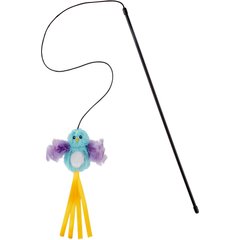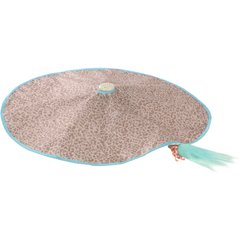Why Do Cats Bring You Gifts?
Adobe Stock/Konstantin Aksenov
If your cat has access to the outdoors, there’s a chance you’ve come across a dead mouse, lizard, or bird on the floor—or even next to your pillow—with your cat sitting nearby, watching you expectantly. Even indoor-only cats might bring their toys to you, meowing and yowling as they carry them over.
This gift-giving behavior is as instinctual for cats as scratching their scratching posts, grooming their fur, kneading, and other classic feline activities, and it’s actually a positive indicator of how they feel about you.
However, this doesn’t mean you want your cat bringing prey to you. It’s important to help encourage your cat to bring you gifts that will keep your home sanitary and won’t harm your kitty or local wildlife populations.
Key Takeaways
- There are a few theories on why cats bring prey to their pet parents.
- This behavior is natural, but it’s also problematic and dangerous for you, your cat, and local wildlife.
- The best way to prevent your cat from bringing you dead animals is to keep your pet inside.
Why Do Cats Bring Home Dead Animals?
There are many theories as to why cats bring home dead animals or present their family members with gifts.
-
One theory is that cats are practicing a skill their mother taught them—to stalk, pounce, and kill prey—before bringing it home to share with family members. Your cat recognizes you as a member of their family, so they might be inclined to share their catch with you.
-
Another theory is that cats are simply bringing their prize back to a location where it’ll be safe from other predators. Your cat likely trusts you to keep watch over their prey (or toy) until they’re ready to eat it or play with it.
-
Because cats will often play with their prey before eating it, your cat might bring you dead animals or toys to engage in a play session with you. As such, gift-giving might be a kind of attention-seeking and bond-building behavior in cats.
How To Stop Your Cat From Bringing Home ‘Gifts’
It’s problematic if your cat is routinely hunting and bringing home prey, and for a few reasons.
-
Cats are incredibly efficient hunters that can do an extensive amount of damage to wild bird numbers in any given area. According to the American Bird Conservancy, cats kill 2.4 billion birds in the U.S. every year.
-
Small rodents, such as mice or rats, that your cat might put in their mouth can carry parasites like tapeworms or might have ingested rodenticide poisons, both of which can make your cat sick.
-
Your cat could be injured if the prey animal bites or scratches them.
-
Letting your cat outdoors unsupervised is dangerous. Many outdoor cats live to be only 2–5 years old (compared to the average indoor cat lifespan of 15–17 years).
The best thing you can do is restrict your cat’s access to wildlife. Keeping your cat indoors keeps your kitty, you, and the local wildlife safe.
If you want to give your cat outdoor time, consider constructing an enclosed patio, such as the Aivituvin® Catio Outdoor Cat House, or training them to walk on a leash and harness.
Smaller playpens, such as the Frisco® Mesh Outdoor Pop-up Cat Playpen Tent & Tunnel, are also available to give your cat safe outdoor time. That way, you can easily monitor them and ensure they’re not disturbing wild animals.
Encouraging your cat to play with toys (instead of prey) can also deter the behavior. Toys that mimic prey, such as the Frisco Bird Wand or the SmartyKat® Instincts Hidden Hijinks Motion Teaser, will help satisfy their hunting instincts.
What To Do if Your Cat Brings Home Prey
If your cat manages to bring home a dead animal, the first thing to do is react as little as possible. Diverting your cat’s attention with a toy or treat might be perceived as a reward for bringing you prey, which could cause the behavior to increase.
Dispose of the dead animal in a sanitary manner, then monitor your cat for any signs of illness, such as:
-
Trouble walking
-
Shaking
If the animal your cat brings home is alive, carefully load the animal into a secure carrier or container and contact your local wildlife organization. If you cannot safely trap the animal, it’s best to call a local wildlife removal company, which can collect it for you and transport it to a wildlife rescue if necessary.
If your cat has any injuries from the animal, make an urgent appointment with your primary veterinarian to get them examined and started on any treatment they might need.


